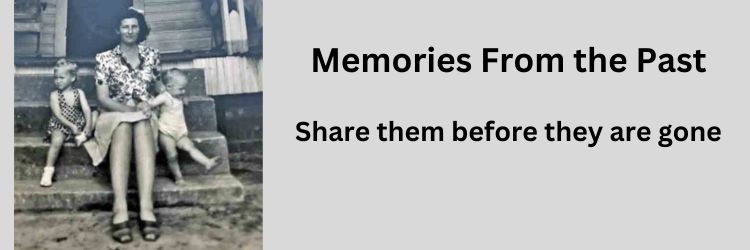Share Those Memories Before They Are Gone
They will disappear with you!
Memories are triggered by different things but they are yours. Once you are gone, they disappear as well unless you share them. That is what I am doing with this post and this blog.
Today’s memory is of a few years of early childhood spent in Perdido, Alabama during World War II.
My dad had been drafted into the navy and sent to the Pacific. My mother took my sister and I to live with my grandparents on their 40 acre farm in this tiny rural town in southern Alabama.
Ginger and I were very young then so many of the hardships of that time probably didn’t bother us much since we didn’t know anything else. The living standards there were normal to my mother and grandparents as well. They had known them all their life.
But thinking back to that simpler time, I remember sitting close to a small fire built in an open fireplace. It was one of two fireplaces that were the only heat in the uninsulated old farmhouse. Oh yes, there was the wood-burning iron cookstove which stood in the middle of the kitchen and used to cook my favorite chicken and dumplings and crispy biscuits.
Water used for drinking and cooking stood in a large white enamel bucket on top of the open cabinets. An enamel dipper sat beside it. That water was precious as it had been drawn up from the ground in an open well in the front yard. The opening to the well was small and covered by a wooden shed with just enough room for a rope and hand-turned pulley to lower and raise the bucket that retrieved the water.
My grandfather had asthma and, by the time we went to live with them, was very sick and unable to do much around the farm. So all the chores of maintaining the large garden that produced the vegetables we enjoyed in the summer and canned for the winter was the responsibility of my grandmother and mother. They also fed the chickens that roamed the yard and then roosted in the shed built for them to keep warm. The rest of the 40 acres had been leased out to another farmer who grew cotton.
Nearby was the two-seater outhouse with pages of an old Sears Roebuck catalog for use as paper. When it was too dark to see any slithering rattlesnakes or too cold to go outside when that outhouse was needed, we used the slop jars that sat under the beds in the bedrooms and were emptied each morning.
When my mother wasn’t working outside, she was inside, oftentimes using the foot-operated sewing machine to make dresses and panties for me and my sister from the chicken feed sacks that were printed with designs for that very purpose. When buying the feed, she searched for designs that matched some she already had because it usually took more than one sack to make a dress.
Years later, after my dad had returned from the war and we had moved back to Pensacola in our own home, I still remember Mother running that old sewing machine to make clothing for us and quilts to keep us warm.
But on the farm in Perdido, we went to bed early each night, not only because we were tired but because it was dark. If my mother wanted to read, and I don’t remember what she read other than the Bible, the light came from a kerosene lamp. Since we had to buy the kerosene, it was precious.
The town of Perdido was small, with an elementary school, a post office, a Masonic lodge, a Baptist church and a Methodist one, and two small general stores. When we needed canned milk for my sister’s bottles, flour for making biscuits, and other necessities that we couldn’t grow or to pick up the mail, we walked to the center of town. We did this frequently as my mother eagerly waited for letters from my dad that she would pick up from the post office.
Before he had gone away, they knew his mail would be censored and he would be unable to tell her where he was in the Pacific. So they had sat down with a map and numbered the islands. In his letters, he would refer to something that she knew wasn’t true using a number that was the code for the island his ship was near.
When we needed something that couldn’t be bought in Perdido, we took the train that ran through the center of the tiny town to Atmore – a larger community several miles away. We would use ration books to buy the one pair of shoes we were allotted each year and other things. I remember the shoes particularly well as after we bought my allotted pair of white high-top shoes for the year, I sat on the back porch and took them off so I could play in my bare feet. The dog found and chewed them. My grandfather gave my mother his shoe allotment to use to buy me another pair and did without new shoes that year.
Memories! In today’s world of flush toilets, light that shines with a flick of a switch, water that flows when you turn a handle, and gas furnaces controlled by a thermostat, yesterday’s memories seem almost unreal.
Each of us has our own memories, our own experiences, and our own dreams. When we die, they die with us. But they are ours – to recall, to savor, and to relive in our minds. Something happens to trigger a particular memory or a time in our past and we relive it again.

